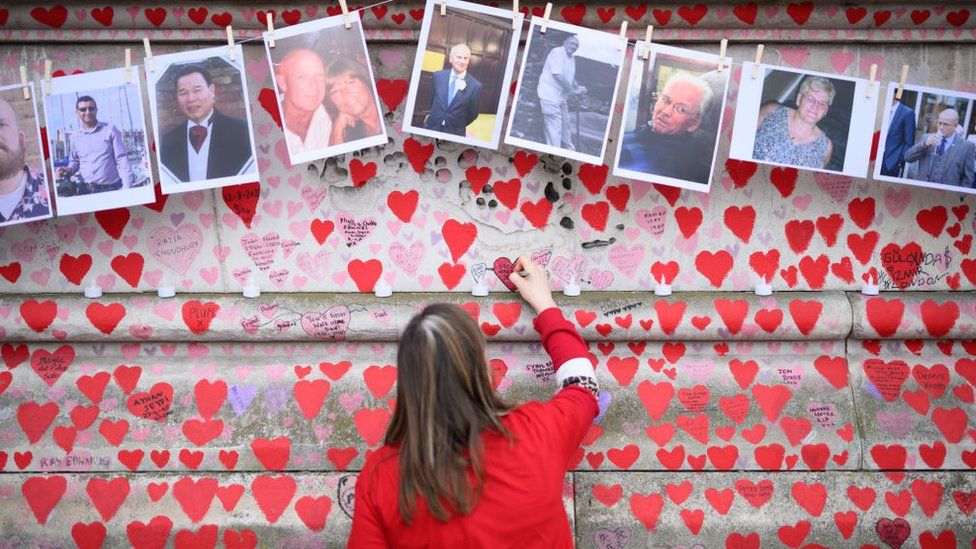ARTICLE AD BOX
By Jasmine Andersson
BBC News
 Image source, Getty Images
Image source, Getty Images
Boris Johnson has announced the launch of the Covid public inquiry and finalised its terms of reference.
Sessions will take place across the UK from next year as it aims to identify lessons from the government's handling of the pandemic,
It comes days after bereaved families warned they could take legal action against the government over delays.
Inquiry chair Baroness Hallett said the hearings would be "firmly independent", with reports issued regularly.
More details about the next stages of the inquiry will be set out next month, the former High Court judge said.
She said her team would travel around the UK to hear people's experiences.
Baroness Hallett will also examine how Covid affected different categories of people, its effect on bereaved families and how the findings could be applied to other national emergencies.
She said a "listening exercise" was scheduled for autumn to allow anyone who wanted to share their experiences to do so.
In a statement, the prime minster said: "The UK inquiry into Covid-19 is now formally established and able to begin its important work."
Image source, UK Parliament
Image caption,Baroness Hallett previously presided over the inquests into the terror attacks in London on 7 July 2005
Mr Johnson appointed Baroness Hallett to chair the inquiry in December 2021, and pledged it would start its work in spring this year.
In a letter to Baroness Hallett, the prime minister said he accepted "in full" the terms she had set out for the inquiry, calling them "broad and challenging".
He said he would appoint two more panel members to the investigation in the coming months so it has "access to the full range of expertise needed".
The inquiry's aims include:
- Listening to the experiences of people affected by Covid by travelling across the UK
- Making the inquiry open, fair and balanced
- Publishing regular reports on the progress
- Preventing suffering and hardship in any future pandemic
It will look at how decisions on limiting the spread of Covid were made and communicated, the use of lockdowns and face coverings, the impact of the pandemic on children and health and care sector workers and the protection of the clinically vulnerable.
Hannah Brady, spokesperson for the Covid-19 Bereaved Families for Justice campaign, said the launch was "a special day for bereaved families from all corners of the country" and hoped "our awful experiences are learned from".
But she said it was "pitiful" that the investigation was launched two days after the campaign group said it was considering a judicial review over "time wasting".
"It goes to show that the government were simply delaying the process for as long as they could get away with," she added.
Liberal Democrat MP Layla Moran, chair of the all-party parliamentary group on coronavirus, welcomed the inquiry and called for interim findings to be published before the next general election.
Several reports have already put the UK government's handling of the pandemic under the spotlight.
A report by MPs on the Health and Social Care Committee and the Science and Technology Committee last October said the UK's failure to do more to stop Covid spreading early in the pandemic was one of the country's worst public health failures.
It said the government approach - backed by its scientists - was to try to manage the situation and in effect achieve herd immunity by infection. The MPs said this led to a delay in introducing the first lockdown, costing thousands of lives.
And a report by spending watchdog the National Audit Office last November found ministers were not properly prepared for a pandemic like Covid-19 and lacked detailed plans on shielding, job support schemes and school disruption.
The government said the unprecedented pandemic had challenged health systems around the world, not just the UK.
Covid infections are rising again in the UK, according to the latest Office for National Statistics (ONS) figures.
About 1.7 million people in the UK had Covid in the week ending 18 June, with experts citing of two new fast-spreading subvariants of Omicron.
However, the latest variants are not thought to be any more lethal than other types of Covid. And the number of people in hospital and in intensive care with the virus is still below the peaks of earlier this year.
In total more than 179,000 people have died in the UK within 28 days of a positive Covid test. But the number of people with Covid on their death certificates is more than 196,000.

 2 years ago
45
2 years ago
45








 English (US) ·
English (US) ·